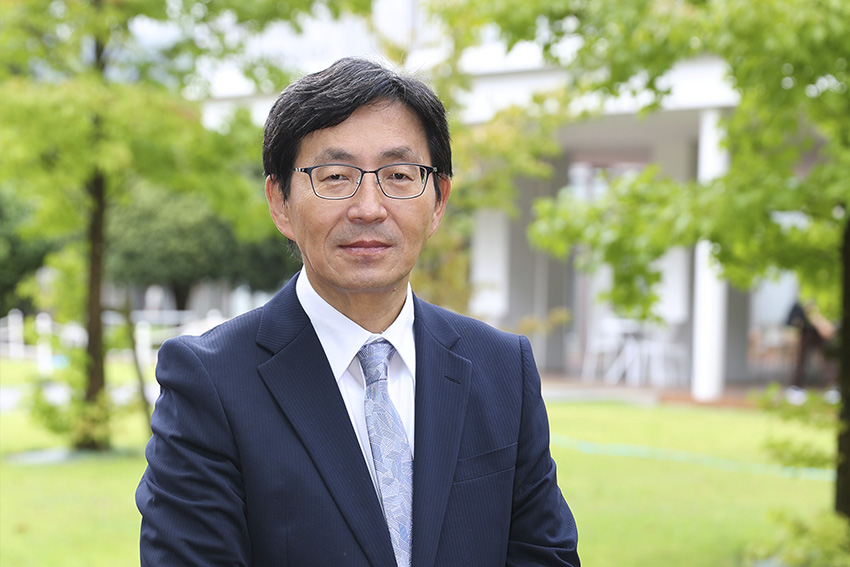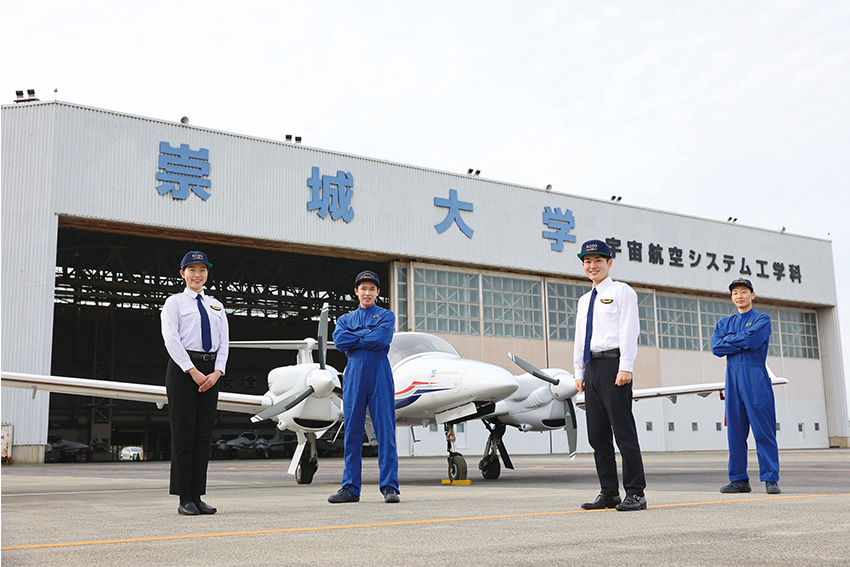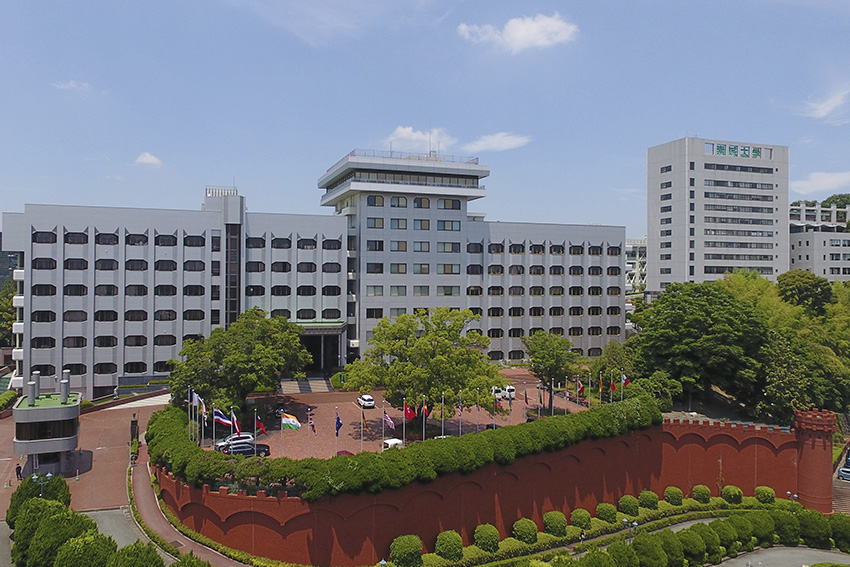At Sojo University, next generation graduates will stand out above the rest thanks to a curriculum that nurtures and develops students to the highest standards.

One of Japan's challenges is its declining population. Compared to other nations, Japan lacks labor force globalization, which is leading to bottlenecks in production and worker shortages. To try to tackle this problem, the government has set ambitious targets to attract 400,000 students from overseas to Japan. What role can universities play in tackling these challenges?
In short, we are a university and, therefore, provide a space to develop and educate people. At the end of the day, universities need to survive, so globalization is, in a way, a key survival strategy. As you mentioned, the Japanese population is shrinking, so one of our goals is to attract foreign students to our university.
Considering we are a place designed to nurture and educate students, we would like to attract students not only from Japan but from many wonderful and varied places all around the world. Additionally, in terms of expertise, knowledge, and discipline, we are essentially a place to create those elements, so it is important to engage people with majors and initiatives. Because of these elements, we can increase our brand as a university.
Our university is located in Kumamoto so we are considered to be a more regional university compared to universities in central hubs like Tokyo. Particularly for regional private universities, the situation is really difficult right now so we have to do something proactive in order to survive. Generating interest in our university is vital for our continued existence. To that end, we established ourselves as a single-discipline university back in 1967, but since then we have expanded to have five faculties in order to nurture and educate future engineers and creators, a key part of what we do, particularly in engineering-related fields.
As you mentioned, the labor force is shrinking rapidly, however, demand is still there, making the situation really tight. Corporations and organizations are fighting to secure workers. Our university has always evolved to cater to the needs of the time, and this is something we will continue to do in the future. With this in mind, I think it is fair to say that we are answering to the government’s policies that you mentioned. I’m sure that you are aware that in Kumamoto the semiconductor industry is booming thanks to the development of a new fabrication plant by Sony and TSMC. We need to cater to those needs by providing education.
To give you some numbers, we send around 10 new graduates a year, and they have to pass an English test. Sojo University has an English learning facility which is nicknamed "SILC" Sojo International Learning Center, where students can learn practical English skills that can be used in society through active learning style classes and self-directed study and that could be a big part of their success in landing jobs. By conducting these training programs, we can contribute to national policy.
In addition to these elements, we also employ professors and faculty members, each with their own respective areas of expertise. They can provide skills and knowledge in certain industries or areas of academia, as well as joint research programs. We can partner with the public and private sectors.
We also provide re-skill training to adults looking to change careers later in life. Our university isn’t just for young Japanese people but also for adults and international students, basically covering all members of society. Simply put, we can provide education to all.
What is different today from what we used to have is the composition of our students. In our undergraduate programs, we have about 3,500 students, and including graduate students, that number is 3,700. About 30% are women, and 70% are men. Back when we started as a single-discipline university, a majority of students were men, but times have changed, and although we are an engineering and science university, we cater to a diverse range of students.
You mentioned the need to attract new people as a lifeline in order to protect Japan. The country should be a very attractive place for students to come since it is one of the safest countries in the world, and with the weakened JPY it has become very affordable considering the excellent facilities available, but looking at the numbers, only 5% of university students in Japan are from overseas. Compare this to the US and Europe which are both around 30% and you can see a big difference. What do you think universities in Japan need to do in order to attract more foreign students and faculty members to come here?
What is really important is to disseminate information about how attractive Japan is to foreign students. These days, we also have a faculty of art, so as you can imagine, there are a lot of things that fall under this category. Fortunately, in this day and age, we have social media, so it is easier than before to be proactive and promote the charming local area.
From an inward-facing perspective, Japan can be a little closed off to the outside world. During the Edo period Japan was completely closed to outsiders, and even though borders have opened since, we still have a long way to go in order to be more welcoming. In order to change, educating in a globalized manner is vital since permeating this more global mindset among people is the only way to become truly global. Another tool is the use of international exchange, and in my opinion, international exchanges are a must in order to prosper in this increasingly globalized world. With these initiatives in full swing, that number you quoted, 5% international students, will inevitably rise.
All of these initiatives are fantastic, but the more deep seated issue is the mindset of people. Additionally, there needs to be financial support in place for international students since they are coming so far to study. One thing we do at our university is provide international students with a 50% discount on their first year of education with us. We also accept state-funded students who have shown excellence in certain fields. In this sense we are contributing to obtaining the government's goals, however, we believe that the country can welcome even more.
Deep down I believe that Japanese people are very kind and have an honorary spirit. We can be shy, however, especially when foreigners meet us for the first time. If you get to know Japanese people well, you will learn that they are very nice people in general. Another point I would like to make is that Japanese elementary education for children is really high. Although this challenge of globalization is difficult, it is important that we take this challenge head-on. There are a lot of opportunities out there to take advantage of this situation, and our school is no different, and to that end we have partnered with 39 schools around the world.
We have an International Exchange Center that is in charge of project planning for international exchanges where we send students overseas. Japanese people going abroad can also learn something new, and at the same time, students can promote the charms of our university and our regional area.

Sojo University's campus, located adjacent to Kumamoto Airport in Kumamoto Prefecture, offers training courses for airline pilots and aircraft mechanics.
One of the criticisms that is leveled at Japanese universities is the difficulty many foreign students have finding employment post-graduation. Often we’ve heard about a lack of support and difficulties navigating the Japanese job market. What kind of success have your international students had in finding employment after they’ve studied here? What framework are you providing students from overseas to assist them in finding employment opportunities post-graduation?
From the Japanese side, the labor market supply is considered really with demand at the level it is, meaning we have about 30-50 job offers per student. With international students, a lot of them used to go back to their home countries in the past, however, today more and more students decide to stay in Japan to land a job. It paints a picture of a labor market that is very favorable for new hires, so there is a strong appeal for students to stay in Japan post-graduation.
One of the strongest points that our university has is the employment support we provide. For the past 12 consecutive years our employment rate for undergrads was more than 98% and last year it was 98.7%. This figure includes international students as well as domestic students and while our university is very strong, I think almost all universities around the world offer some sort of career support to graduates. On top of our activities, we also have a career advisor for each department that can help students land jobs.
In the current corporate landscape, companies are desperate to hire skilled graduates who are eager to learn. This has created a very advantageous situation for those looking to graduate in the next few years. It doesn’t matter if they are Japanese or international; I think there are plenty of jobs out there for graduates, particularly from our university.
One thing in particular that we have focused on in the first academic year is providing a systematic career program, sometimes in cooperating with other companies. We conduct problem-based learning (PBL) to provide this very systematic, career-oriented education. We started to think about this ten years ago, and during this period we have carried out a lot of reforms to adapt our curriculum. This has led to the successful employment of many of our graduates, and in a sense, helps contribute to the human capital that will develop society after they graduate.

Main campus of Sojo University, Ikeda, Nishi-ku, Kumamoto, Kumamoto, Japan.
During our research we saw that your medium-to-long-term strategy is really focused on providing a strategic response to this post-AI era, preparing students to have the skills and abilities that they need to be successful in their professional lives during this needed time in history. There is definitely an emphasis on interdisciplinary skills and problem-solving skills. How do you ensure that this plan will remain fluid and can change with the times as technology continues to advance?
The first pillar of what we provide is more of a liberal arts style education, sort of these human capabilities, and the other side of that coin is more specialized skills and expertise, which is where our PBL approach comes into play. In the past students would say something like “This is what I learned as a student,” but in today’s environment what is more important is what we can do with the knowledge that we’ve learned. One of the appeal points our university has is the very pragmatic and practiced orientation which lets students learn through experience.
When it comes to specialized knowledge, I think it is very important that we nurture students with problem-solving capabilities in order for them to be receptive to changes in society. They need to be able to read what is going to happen in the future and make creative tweaks to their expertise in order to adapt to potential new environments. Essentially, they need to be flexible and have a mindset where they are willing to update themselves. In order for them to be flexible, we also need to be flexible, especially in the educational environment that we provide them.
When we talk about post-AI, we are talking about 10 or 20 years time, so by demonstrating this flexible mindset of continual improvement we can lead students to transform with the era, which will inevitably lead to innovation and creation. To ensure that these activities are something prevalent within our university we have something called Faculty Development (FD) which is very similar to a plan-do-check-act (PDCA). It is human nature that sometimes when left to your own devices you can be lazy, so we need to have checks and balances between each other. Reform as an organization is a constant must.
Imagine that we come back in five years and have this interview all over again. What goals or dreams do you hope to achieve by the time we come back for that new interview?
First of all, the survival of our university is a must for me, and fortunately, we are within the top 50% of private universities that are able to secure enough students to survive. However, in order to continue to survive, increasing awareness of our brand is a must. Contributing to society is something that I consider very important, so building up students and nurturing them to become people who can impact society in a very positive way is something our university takes very seriously.
I am a little worried about the Japanese economy in particular with the recent rapid depreciation of the JPY. We would like our technical capabilities to contribute to boosting the economy. In order to do so, we as a university must ensure that we prepare our students to make those contributions on our behalf, nurturing the next generation to make society a better place for the future. At the end of the day, those young people are the future and they will be the ones to choose the path our country and our planet will take in the decades to come. We are really proud of our university and believe that Kumamoto is a wonderful place to live and learn. We hope that people will see our university and the programs we provide to students.
For more information, visit their website at: https://www.sojo-u.ac.jp/en/
0 COMMENTS